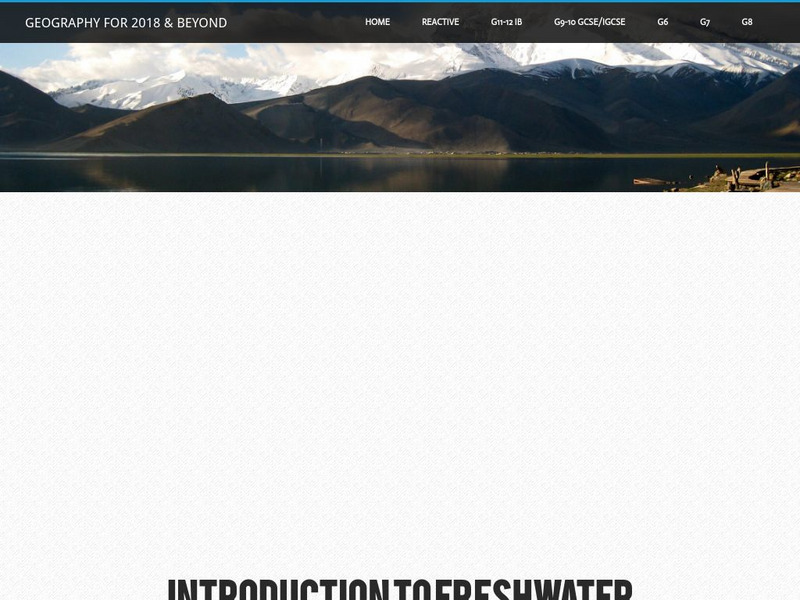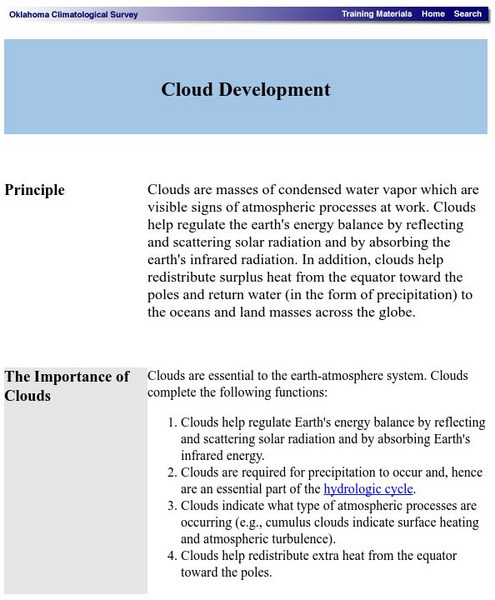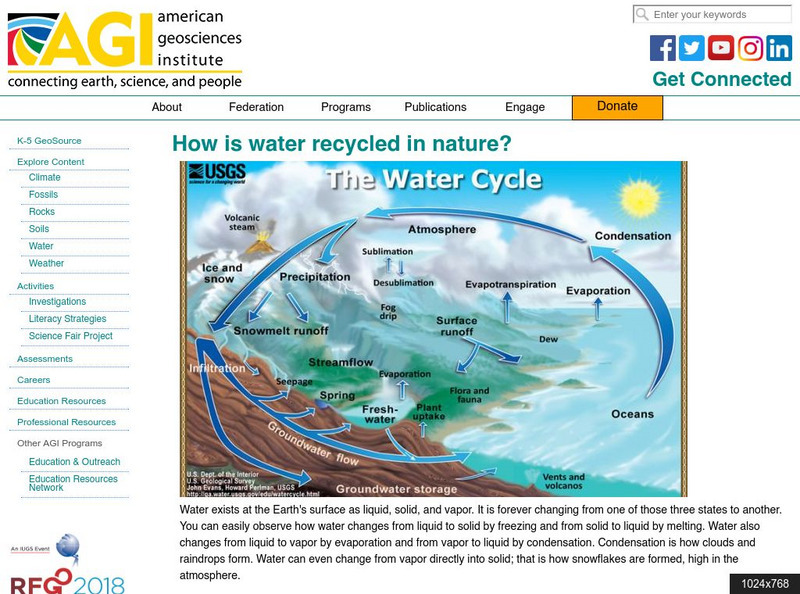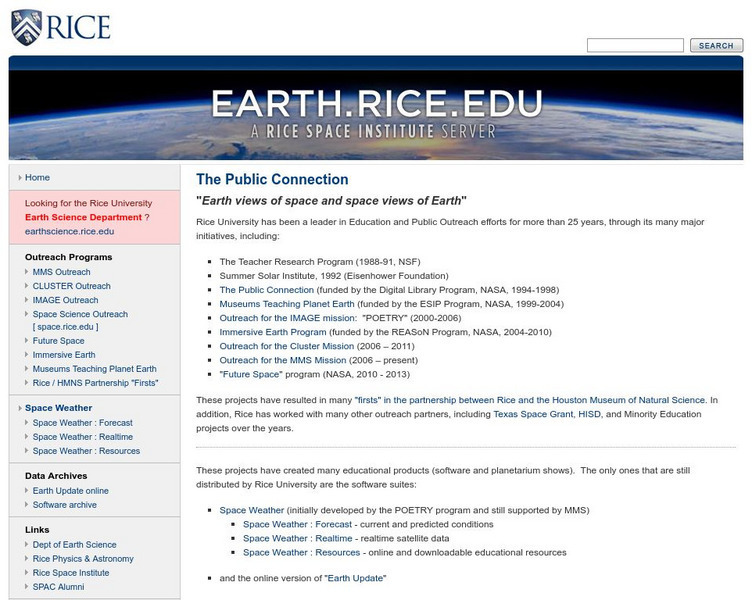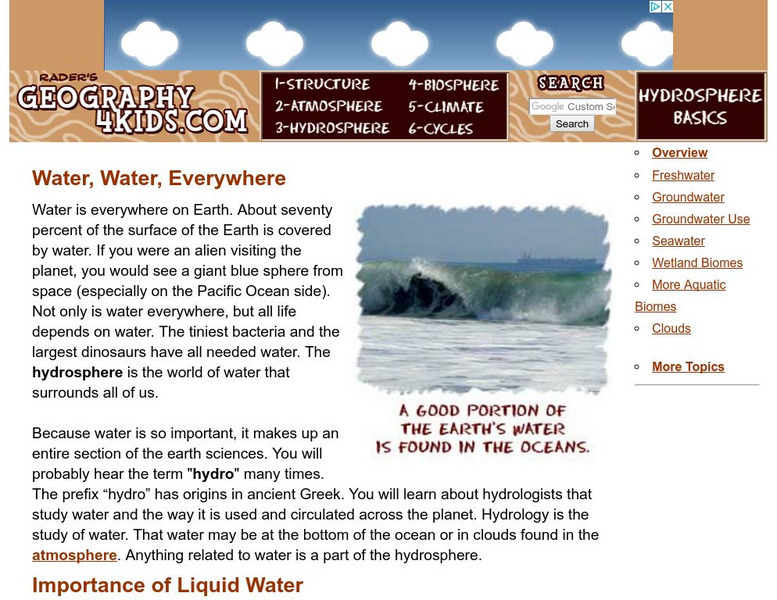Geographypods
Geographypods: Freshwater: Issues and Conflicts: The Water System
This learning module examines the Earth's stores of fresh water and how the balance between stores of water in the oceans and in ice is changing. Students then investigate how a maximum sustainable amount of freshwater can be achieved by...
Oklahoma Mesonet
Oklahoma Climatological Survey: Cloud Development
This site explores the importance of clouds and how clouds are formed. Content details common atmospheric cooling mechanisms and atmospheric stability.
Georgia Department of Education
Ga Virtual Learning: Ap Environmental Science: Aquatic Biomes and Ecology
Students explore Earth's most important natural resource, water, and learn about how the planet's aquatic biomes thrive and support life.
TeachEngineering
Teach Engineering: Flood Analysis
Students learn how to use and graph real-world stream gage data to create hydrographs and calculate flood frequency statistics. They also learn how hydrographs help engineers make decisions and recommendations to community stakeholders...
Other
Few: Human Impact on the Environment & Environmental Impact on Humans
Human beings have an enormous impact on the natural environment, and ultimately on each other. The way we chose to house, clothe, shelter, and meet the needs for vital resources such as food, energy, and water, not only affect the...
US Geological Survey
Usgs: The Usgs Water Science School
Use this site as a resource to learn about the many aspects of water.
Globe
The Globe Program: Discoveries at Willow Creek [Pdf]
Join Anita, Dennis and Simon as they take a field trip to Willow Creek. This visit to the creek is slightly different than their first encounter there--discover why by reading this interesting tale!
American Geosciences Institute
American Geosciences Institute: How Is Water Recycled in Nature?
Learn about nature's most reliable geochemical cycle, the water cycle.
American Geosciences Institute
American Geosciences Institute: Earth Science Week: Water: A Never Ending Story
Students carry out a number of activities that demonstrate the concepts of evaporation, condensation, precipitation, and soil moisture and runoff. Then students construct a terrarium as a way to observe the water cycle. Immediately...
US Geological Survey
Usgs: How Much Water Is There on (And In) the Earth?
The USGS gives an overview of the amount of water on Earth and where it is located. It gives a few interesting facts about the Earth's supply of water. Click Home to access the site in Spanish.
Science Education Resource Center at Carleton College
Serc: Lab 2: What's a Watershed?
Students build a physical model to simulate watershed features, then use Google Earth software to tie the model to a real place. By exploring several layers of map-based images and data, students learn the complexity of a watershed and...
US Geological Survey
U.s. Geological Survey: Where Is Earth's Water Located?
Find out how much of the water on Earth is actually usable by humans, and where the rest of it is located. Learn where our water comes from and why it never runs out. Click Home to access the site in Spanish.
Other
Pennsylvania Department of Environmental Protection: Just for Kids: Watershed
What is a watershed? Learn the answer to this question and find out about the Susquehanna River watershed on this site.
Next.cc
Next: Oceans
Learn about the importance of oceans and their connection to weather by completing the five activities. Explore further by clicking on one of the numerous links provided.
My Science Site
Groundwater: Nature's Hidden Treasure [Pdf]
This resource provides an extensive unit on "The extent and importance of groundwater in Canada." Incorporates other subject areas other than science such as math, history, art and local research. A test is provided at the end and...
Rice University
Museums Teaching Planet Earth: Hydrosphere
This tutorial looks at the hydrosphere, that component of the earth that is liquid water such as rivers, streams, oceans, and so on.
Other
Njawwa: Kids' Water Zone
Students can learn fun facts about water, perform experiments with it, and play games about it. Includes links and a suggested reading list.
PBS
Iowa Public Television: Water Mini Web Quest [Pdf]
Browse the Explore More: Water Quality website to answer these questions about how water is used, who uses it and how these uses impact the quality of water. Find ways to make a difference in water quality through the choices you make.
Geography 4 kids
Geography4 kids.com: Flowing Water
Take a look at the earth's hydrosphere. From liquid to glacier, to vapor, to oceans and clouds this text offers an overview for young researchers.


